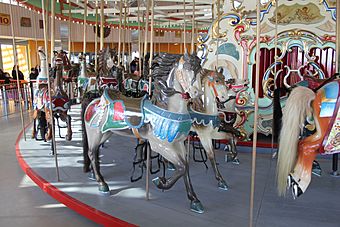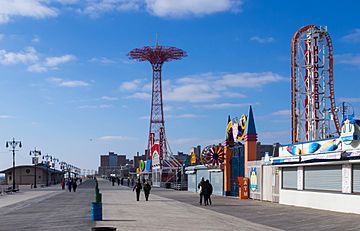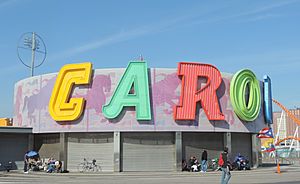- This page was last modified on 17 October 2025, at 10:18. Suggest an edit.
B&B Carousell facts for kids
|
B&B Carousell
|
|

The carousel's multicolored horses, restored in 2008–2013
|
|
| Location | 1615 Boardwalk, Brooklyn, NY |
|---|---|
| Built | c. 1906–1909 |
| Architect | William F. Mangels, Marcus Illions |
| NRHP reference No. | 16000035 |
| Added to NRHP | February 23, 2016 |
The B&B Carousell is a special carousel located at Coney Island in Brooklyn, New York City. It was built around 1906 to 1909 by William F. Mangels, who was a carousel maker from Coney Island. The beautiful wooden horses were carved by Marcus Illions.
Over the years, the carousel has moved and been fixed up many times. Since 2013, you can find the B&B Carousell in Luna Park. The name "Carousell" comes from how Mangels spelled the word in his catalogs. The "B&B" stands for William Bishoff and Herman Brienstein, who used to own it.
In 1927, Charles Carmel made new horses for the carousel. Later, in the 1940s, August Wolfinger painted cool pictures on the carousel's outer panels. The B&B Carousell is the very last working carousel in Coney Island. In 2016, it was added to the National Register of Historic Places, which means it's a really important historical site.
Contents
What Makes the B&B Carousell Special?
The B&B Carousell has fifty horses and two chariots. It has 18 sections of horses that spin around the middle. Most sections have three horses side by side.
Moving and Still Horses
Many of the horses, 36 of them, can move up and down as the carousel spins. These horses are attached to shiny brass poles. The poles have a cool spiral design.
Some horses and both chariots do not move. There are 14 horses that stay still. The chariots are like small carriages where you can sit. They take up the space of two horses.
Unique Horse Carvings
Most of the horses you see today were carved by Charles Carmel in 1927. The original horses were made by Marcus Illions. The horses and chariots sit on a spinning wooden platform. The platform's edges are painted red.
The horses come in different sizes. The biggest horses are on the outside of the carousel. The smallest ones are on the inside. Each horse has its own unique design, colors, and dramatic poses.
One special horse has a plaque that says: "Abraham Lincoln Centennial Horse. Riders Not Permitted. Built by MC Illions. 1909." This horse was made by Illions to celebrate Abraham Lincoln's 100th birthday. It's the only horse originally carved by Illions that is still on the B&B Carousell.
Inside the Carousel
The main frame of the carousel was built by William F. Mangels. In the center of the carousel, there's a big pole. This pole is hidden by a fairground organ on one side. The other three sides have gold-framed mirrors.
The organ was made in Germany around 1917. It was later updated in the 1930s. This type of organ is very rare, with only three known to exist.
Long ago, riders could try to grab a single brass ring while on the carousel. If you caught it, you got a free ride! This brass ring was later removed.
The Carousel's Building
The B&B Carousell is located inside a round building. This building was built between 2011 and 2013 when the carousel moved to Luna Park. A large sign with the word "Carousell" hangs near the top of the building.
The panels around the top of the building are called rounding boards. They have paintings of American symbols. These include the United States Flag, the bald eagle, Abraham Lincoln, and the Statue of Liberty.
History of the B&B Carousell
The B&B Carousell is one of many carousels that have been part of Coney Island's history. In its busiest times, Coney Island had up to a dozen carousels at once. There was even a special "Coney Island" style for carousel horses.
Early Days and Moves
Mangels and Illions built the B&B Carousell between 1906 and 1909. It was first located in New Jersey. It was probably in Asbury Park before moving to Lake Hopatcong in 1927.
Around the time it moved to Lake Hopatcong, Charles Carmel carved new horses and the two chariots. In 1932, William Bishoff and Herman Brienstein bought the carousel. This is where the "B&B" in its name comes from.
The carousel came back to Coney Island by 1934 or 1935. It was first on Surf Avenue. Five years later, it moved to another spot on Surf Avenue. In the 1940s, August Wolfinger painted the carousel's rounding boards.
Saving the Carousel

View looking west from Riegelmann Boardwalk; the B&B Carousell is the structure with the multicolored sign at bottom center, just behind the sign for the Thunderbolt roller coaster. The Parachute Jump can be seen in the background, behind the carousel building.
In the 1960s and 1970s, Coney Island became less popular. James McCullough and Mike Saltzstein bought the B&B Carousell in 1973. By 1979, it was one of the last carousels left in New York City. A ride cost 50 cents back then.
When Saltzstein passed away in 2001, the B&B Carousell was the only amusement ride left north of Surf Avenue. Out of thousands of wooden carousels made between 1880 and 1930, only about 175 remained. The B&B Carousell was one of them.
Restoration and Reopening
A developer named Joe Sitt bought the land where the carousel was located. After Saltzstein's death, it was hard for McCullough to keep the carousel running. The carousel was almost sold at an auction.
But in 2005, a kind person bought the carousel and gave it to the government of New York City. The city stored it safely at the Brooklyn Army Terminal.
Starting in 2008, the horses of the B&B Carousell were carefully restored. A carousel restorer named Todd W. Goings worked on them in Ohio. The restoration involved finding and using over 80 colors that matched the horses' original paint. They even gave the horses new tails made of real horsehair! This restoration cost $1.7 million.
In 2011, the city announced that the B&B Carousell would be put back in Luna Park. It finally reopened in 2013. In 2016, it was officially listed on the National Register of Historic Places. It remains Coney Island's last working carousel, a true piece of history!


